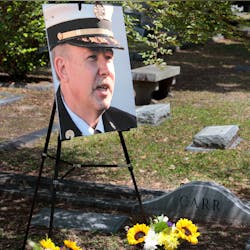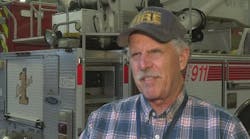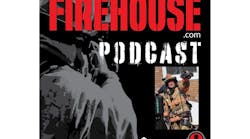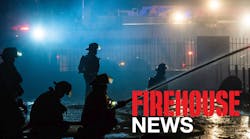As I write this article on April 24, 2023, the department that I love celebrated the life of Fire Chief Thomas Carr Jr., who passed away 10 years ago on April 24, 2013, from multiple system atrophy (MSA), which is a severe form of Parkinson’s disease. He was only 59 years old.
Everywhere that you look around our department, you can see his touch and influence. He was a great man and an incredible leader who had that specialness that few leaders ever find.
On the personal side, he is deeply rooted in my leadership journey as well.
All that said, how does one describe a man who had so much influence on one’s life when he never even knew it?
An inspiration
Thomas Carr Jr. came to the Charleston, SC, Fire Department to be our fire chief following the loss of nine of our firefighters on June 18, 2007, at the Sofa Super Store fire. One hundred forty one applicants wanted to be the leader who would guide us through that tragic time in Charleston’s history. Lo and behold, the one who was selected was born in Charleston on March 19, 1954. His family ties are deep in the Charleston area, but his mother and father moved the family to Montgomery County, MD, when he was a child. Chief Carr went on to have a full fire service career in Montgomery County, where he started as a volunteer and worked his way through the ranks to be the fire chief of the department—a department that was almost 10 times the size of Charleston’s.
Chief Carr retired from Montgomery County in 2005, but the fire service called him back, specifically to his birthplace, to help our department overcome the loss of nine firefighters and to help us make sense of all of the scrutiny that we were under. What a challenge that had to be for him. However, Chief Carr was unfazed by the monumental task that was in front of him.
Looking back on it now, it’s incredible what he taught us just by him being him.
Overseeing a total rebuild
I remember the first time that I stepped into Chief Carr’s office. I looked around. The walls were covered with large pieces of paper. As I moved closer to them, I saw titles at the top of them and then lists under the titles. One was titled “Apparatus,” another “Operations,” then “Fire Marshal,” “Training,” “Administration,” “Public Information Officer” and so many others. I was in awe. He had set goals based on the feedback that he was receiving from department members during the daily station visits that he had been completing for months.
When Chief Carr came to my station to eat dinner with us, I was an assistant engineer and struggling after June 18, 2007, as were my fellow members. We were doing the best that we could—no mental health program or peer support team—but the stress of losing nine firefighters took its toll on many of us. Chief Carr realized very quickly that we needed help, not just to improve the department but also with the traumatic memories of June 18 and the days that followed. I can’t imagine how much this had to weigh on him nor how he even decided where to start. It was a total rebuild of a system and of the people who were involved in the system.
Determination
How did Chief Carr take a department that was reeling from an incident in which nine firefighters died and was under the microscope of the fire service to the point where we progressed at a rate that was unseen in modern times?
He had compassion and integrity. He empowered us. He was stoic, knowledgeable, humble, kind, genuine and loving. Most importantly, Chief Carr was a person who made you want to be a better person.
Everything that he did I watched. I was in awe about how he carried himself so calmly but also so confidently. He had this aura about him that, when you saw him, you knew that he was someone who you could learn from.
Unfortunately, after being in our department for about two years, in 2010, Chief Carr announced that he had MSA but that he would continue to work as long as he was physically able. His mind was sharp, but his body was starting to weaken from the disease.
He was true to his word.
The department installed a lift, so he could get to his office on the second floor of headquarters. Toward the end, some of our other chief officers would go to Chief Carr’s house, physically carry him from his wheelchair to the chief’s vehicle and drive him to headquarters. They then would lift him out of the chief’s vehicle and carry him to the lift. They would walk up the stairs next to the lift to ensure that he was safe. On the second floor, they would carry him to his wheelchair then place him at his desk to work. He was so weak at times that someone would place his hands on his keyboard so that he could type.
Can you imagine how difficult that it must be mentally when your body is failing you but your mind is 100 percent sharp?
A legacy
Shortly after these types of experiences, Chief Carr retired. Unfortunately, he was confined to his bed, because he couldn’t move anymore. A group of us would go to his house and do lawn maintenance, so his family could focus on his care. It was during one such visit that I saw him alive for the last time.
I just finished cutting some bushes and was about to leave for the day. I was guided into his room by his wife, Ms. Anne, and I sat by him. It was so sad to see him this way. I could tell that he could hear me and that he understood what I was saying: He moved his eyes as if he were following along with what I was talking about. I never will forget that experience and how it ignited a fire in me.
Chief Carr never got to see his vision come to fruition. However, I assure you that his progressive ideas continue to influence our department and countless others that are in our area and all around the emergency services. What a legacy to leave behind.
Thank you, Chief Carr, for what you taught us. Thank you for what you taught me. You’ve had a profound effect on my life and the life of so many others. We will never forget you.
Dr. David Griffin will present “Resiliency Is the Way” at Firehouse Expo. He will co-present the Pre-Conference Workshop “The Morale Dilemma” with Dan Curia. To register, visit firehouseexpo.com.






